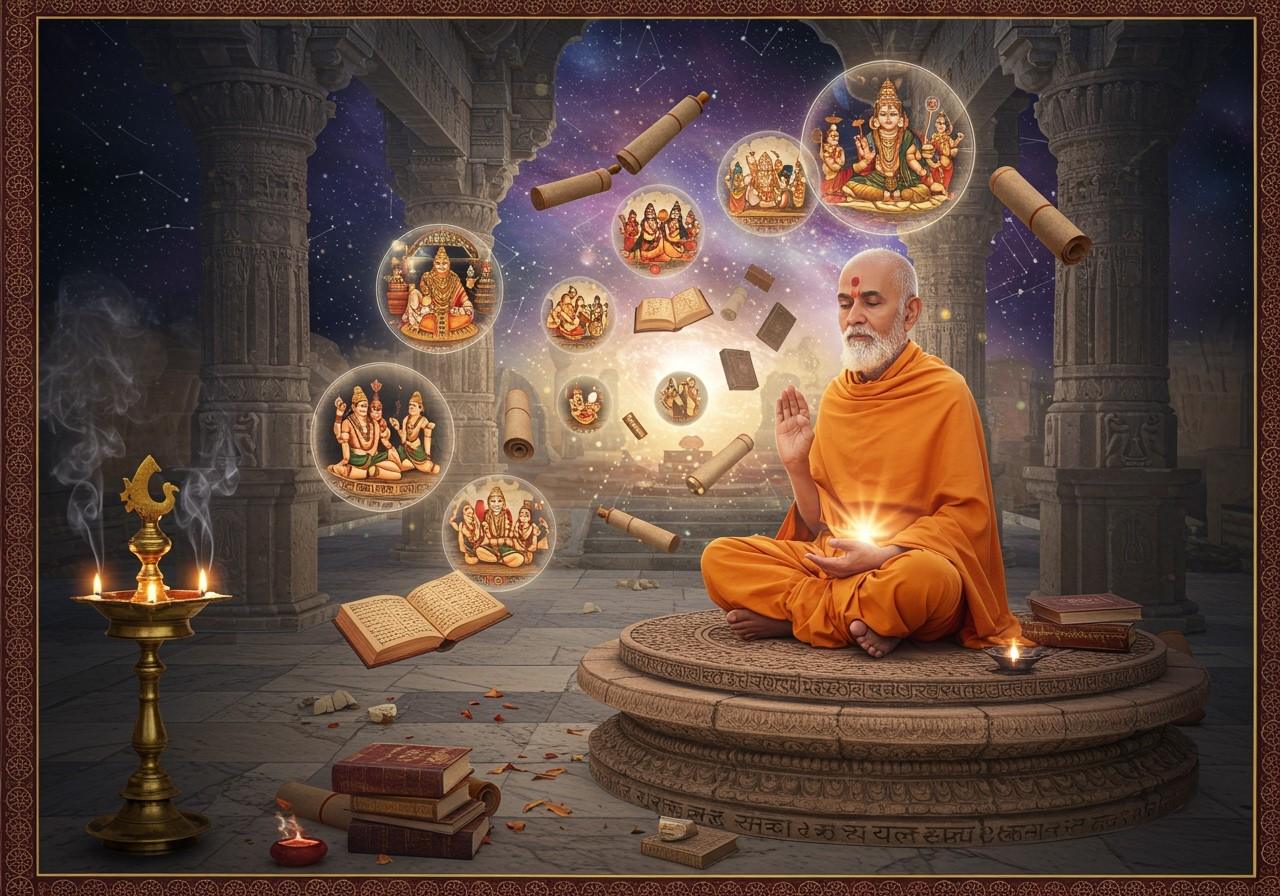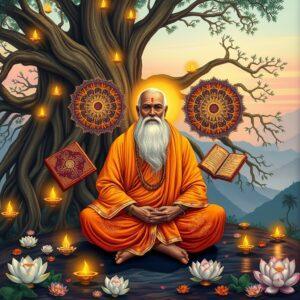
Mimamsa, a profound branch of Vedic hermeneutics, plays a crucial role in comprehending ancient Indian scriptures. Derived from the Sanskrit word meaning “reflection” or “revered thought,” it guides the interpretation of the Vedas, emphasizing rituals and dharma (duty). For those cherishing tradition, Mimamsa is indispensable for preserving and practicing authentic rituals.
What is Mimamsa?
Mimamsa delves into the intricacies of Vedic interpretation. It focuses on rituals and dharma, providing a framework for understanding their significance. It is divided into two branches:
- Purva Mimamsa: This branch, meaning “prior reflection,” deals with the correct performance of rituals, ensuring adherence to Vedic prescriptions.
- Uttara Mimamsa: Also known as Vedanta, this branch, meaning “latter reflection,” explores the philosophical teachings of the Vedas, delving into the nature of reality and the self.
Mimamsa in Hindu Philosophy
As one of the six orthodox schools of Hindu philosophy, Mimamsa holds a significant position. Scholars like Jaimini have made substantial contributions to its development. The Mimamsa Sutras, composed by Jaimini around the 2nd century BCE, serve as foundational texts, emphasizing the importance of ritual actions and their consequences.
Key Concepts in Mimamsa
Several key concepts form the core of Mimamsa:
- Dharma: Dharma represents the duties and ethical principles prescribed by the Vedas, guiding individuals towards righteous conduct. It encompasses the principles of righteousness, duty, and moral order.
- Karma: Karma refers to actions, particularly ritual actions, and their repercussions. It emphasizes the cyclical nature of cause and effect.
- Apurva: Apurva denotes the unseen force generated by rituals, believed to produce future results. It’s a potent concept explaining the efficacy of Vedic rituals.
- Arthavada: Arthavada encompasses explanatory statements within Vedic texts, providing context and deeper understanding. These statements clarify the purpose and meaning behind rituals.
- Vidhi: Vidhi represents injunctions or commands within the Vedas, specifying how rituals should be performed. These are the direct instructions for performing Vedic rituals.
- Yajna: Yajna signifies sacrificial rituals, central to Vedic practice. These rituals are performed to invoke deities and maintain cosmic balance.
- Pramana: Pramana refers to the means of valid knowledge, including perception and inference, used to validate Vedic knowledge. It’s the epistemological foundation of Mimamsa.
Mimamsa Meaning in Hindi and English
In Hindi, Mimamsa translates to ‘विचार’ (vichar) or ‘अन्वेषण’ (anveshan), both meaning “reflection” or “investigation.” In English, it carries similar connotations, emphasizing critical inquiry and interpretation. Accurate translations are vital for preserving the essence of these ancient texts.
Practical Applications of Mimamsa
The principles of Mimamsa extend beyond theoretical understanding and find practical application in various aspects of life:
- Rituals: Mimamsa provides guidelines for performing rituals correctly, ensuring their efficacy and adherence to tradition. This includes detailed instructions on procedures, mantras, and offerings. For a deeper understanding of the science behind Puja and its benefits, refer to Understanding the Science Behind Puja for Holistic Well-being.
- Ethical Decision-Making: Mimamsa’s emphasis on dharma offers a framework for ethical decision-making, guiding individuals towards righteous actions. This framework helps individuals align their actions with moral principles.
- Daily Life: Integrating Mimamsa principles into daily life promotes mindfulness and adherence to dharma, leading to a more fulfilling existence. This involves incorporating Vedic values into everyday routines.
How Poojn.in Supports Your Spiritual Journey
Poojn.in offers a wide selection of authentic puja items, carefully curated to support your spiritual practices. Our collection includes:
- Pure copper and brass puja items: These items, crafted with traditional techniques, are ideal for daily worship and rituals. Browse our selection of brass kulos.
- Traditional rudraksha malas and sacred threads: Enhance your spiritual practice with genuine rudraksha malas and sacred threads, known for their positive energy. Explore our range of kora dhotis.
- High-quality dhoop and incense: Create a sacred atmosphere with our premium dhoop and incense, perfect for ritual offerings. Discover our camphor offerings.
- Pure silver items for temple worship: Elevate your temple worship with our exquisite pure silver items, crafted with utmost reverence. Consider our brass Lakshmi murtis.
- Specially curated Shiva puja sets: Simplify your Shiva puja with our comprehensive sets, containing all the essential items. Explore our Lord Shiva murtis.
Visit www.poojn.in to discover our complete collection and enhance your spiritual journey.
Conclusion
Mimamsa is not merely an ancient philosophy; it’s a living tradition that continues to guide spiritual seekers. By understanding its principles, we gain a deeper appreciation for the significance of rituals, dharma, and the Vedic scriptures. Embrace Mimamsa to enrich your spiritual journey and connect with the wisdom of our ancestors. You can further explore related topics such as aligning your puja with celestial energies here and understanding the role of birth charts in puja practices here.


